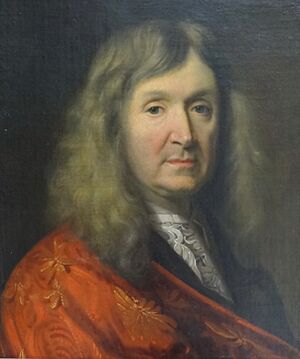Thomas Corneille facts for kids
Thomas Corneille (born August 20, 1625 – died December 8, 1709) was a French writer. He was known for writing plays (a dramatist) and for creating dictionaries (a lexicographer). He was the younger brother of the very famous playwright, Pierre Corneille.
Contents
Life of Thomas Corneille
Thomas Corneille was born in Rouen, France. This was about 19 years after his older brother, Pierre. Thomas showed his talent for writing early on. When he was just 15, he wrote a play in Latin. His classmates at the Jesuit school in Rouen performed it. This school is now called the Lycée Pierre Corneille.
His first play written in French was called Les Engagements du hasard. It was likely performed in 1647. Another play, Le Feint Astrologue, came out the next year. This play was based on a Spanish play.
After his brother Pierre passed away, Thomas took his place in the Académie française. This is a very important group that looks after the French language. Thomas then started to focus on philology, which is the study of language. He helped create a new edition of a famous book about French grammar in 1687.
His own dictionary, Le Dictionnaire des Arts et des Sciences, first appeared in 1694. This book was a big deal. It was seen as one of the most important encyclopedias before the famous Encyclopédie by Denis Diderot and Jean le Rond d'Alembert.
In 1697, he finished a full translation of Ovid's Metamorphoses. This is a classic collection of myths.
By 1704, Thomas Corneille lost his eyesight. Even though he was blind, he kept working. In 1708, he finished a huge three-volume dictionary. It was called Dictionnaire universel géographique et historique. This was his last major work. He passed away in Les Andelys when he was 84 years old.
Plays by Thomas Corneille
Thomas Corneille wrote many plays during his life. Here are some of them:
- Les Engagements du hasard (1647)
- Le Feint astrologue (1648)
- Don Bertrand de Cigarral (1650)
- L'Amour à la mode (1651)
- Le Charme de la voix (1653)
- Les Illustres ennemis (1654)
- Le Geolier de soi-même (1655)
- Timocrate (1656)
- Bérénice (1657)
- La Mort de l'empereur Commode (1658)
- Stilicon (1660)
- Le Galant doublé (1660)
- Camma (1661)
- Maximian (1662)
- Persée et Démétrius (1663)
- Antiochus (1666)
- Laodice (1668)
- Le Baron d'Albikrac (1668)
- La Mort d'Annibal (1669)
- La Comtesse d'Orgueil (1670)
- Ariane (1672)
- La Mort d’Achille (1673)
- Don César D'Avalos (1674)
- Circé (1675)
- L'Inconnu (1675)
- Le Festin de pierre (1677)
- Le Triomphe des dames (1676)
- Le Comte d'Essex (1678)
- La Devineresse (1679)
- Bradamante (1695)
Opera Works
Thomas Corneille also wrote the words for operas, which are called librettos.
- Médée for the composer Charpentier (1693).
His Place in French Literature
Some people thought Thomas Corneille was only famous because of his very famous brother, Pierre. But others believed he was a great writer in his own right. They felt he was just unlucky to have a brother who was even more brilliant.
In 1761, the famous writer Voltaire said that Thomas Corneille was the best writer of his time, second only to Jean Racine. This shows how highly he was thought of.
The two brothers, Thomas and Pierre, were very close. They even lived together for a time. Thomas wrote 42 plays in total. He also worked with other writers on some of his plays. Two of his most famous plays are Ariane (1672) and Le Comte d'Essex (1678).
Thomas Corneille's play Timocrate was incredibly popular. It ran for 80 nights, which was the longest run for any play in that century! For another play, La Devineresse, he and his co-writer earned a huge amount of money. This was the most money paid for a play during that time.
Thomas Corneille was also known for trying out new types of plays. He wrote "machine plays" like Circé, which used special stage effects. He also wrote three opera librettos. This made him one of the most important French opera writers of his time.
A famous quote from Thomas Corneille is: "Le Crime fait la honte, et non pas l’échafaud!" This means "The crime causes the shame, and not the scaffold!" This quote was even used by Charlotte Corday before a very important moment in history.


